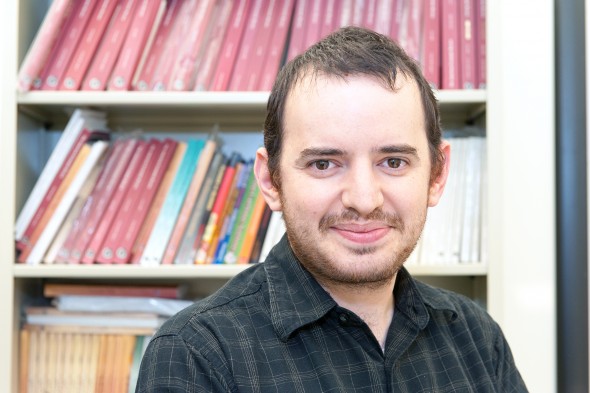Economist measures the value of earnings and education

Students whose parents were laid off are less likely to go to college, even in adulthood, says Ben Ost, who studies the connections between education and future earnings. Photo: Roberta Dupuis-Devlin/UIC Photo Services
Is a low-performing student better off dropping out of college? What happens to a teacher’s evaluation when she has to handle a disruptive student? If a parent is laid off from work, will that affect the child’s income in adulthood?
Those are some of the questions Ben Ost tries to answer.
Ost (rhymes with coast), assistant professor of economics in the College of Liberal Arts and Sciencess, says a job layoff has dramatic consequences for a worker’s income, health — even happiness. “These consequences have been shown to be long-lasting such that the earnings of laid-off workers do not fully recover even 20 years after the layoff,” he said.
Another long-term impact he has studied is intergenerational — when reduced income prevents parents from investing in their children’s education, Ost said.
With graduate student Weixiang Pan, he is using data that tracks parents and students over time to see whether a layoff when a child is 15 to 17 years old impacts college attendance, how far the child goes in school and eventual income. They’ve already found that students whose parents were laid off are 10 percent less likely to have enrolled in college by age 30.
“During the height of the Great Recession, 326,392 U.S. workers were laid off in a single month,” Ost noted. “Our research suggests that the total consequences of these layoffs extend beyond the direct impacts on workers.”
Ost also looks at what happens when college students leave school because they’re doing poorly. “In the short term, their earnings go up because they’re not spending time studying,” plus they stop accruing debt, he said. “Five or 10 years later, they end up earning less. So even for low-performing students it’s beneficial to stay in school.”
A related question is how working affects studies.
Ost said most students have a job. “In Ohio, 20 percent work full-time while enrolled in school,” he said. “More than half work some hours while in school. This is a large increase from 40 to 50 years ago.”
Work may compete with study time, but some students couldn’t afford school if they weren’t employed. “If you’re working and your company shuts down or lays you off, do you keep investing in school or drop out because you can’t afford it?” he said.
The indirect effects of teacher evaluations
Ost wrote a paper on teacher quality that examines the fairness of teacher assessment in Chicago, Washington, D.C., New York and Los Angeles.
“The evaluation history is based primarily on principal observations, but in the last five years, many school districts have begun basing evaluation on student test scores,” he said.
“The model often suggested is value added. The logic behind this is that the teacher doesn’t have control over incoming students, but their gains are the teacher’s responsibility.”
Ost just completed a paper demonstrating that disruptive students reduce their peers’ performance. Because of this, teachers who teach disruptive students will be evaluated as lower quality than other, equally effective teachers.
If teachers’ assessment suffers as a result, it may produce “a perverse effect,” he said. “Teachers might avoid trying to teach these types of students, and might leave schools that have a lot of disruptive students.”
Born in Israel, Ost moved to Utah six weeks later and lived in Skokie after age 4. He earned a bachelor’s degree at Grinnell College and a Ph.D. at Cornell University, joining UIC in 2011.
He lives in Evanston with his wife, Carrie, a lab manager at Northwestern University. They have a 1½-year-old daughter, Maya, and expect another child in December.
Ost used to be a “quite avid” chess player, playing competitively in high school and college and teaching courses in the game while an undergrad. He also plays the cello.
At Cornell, he taught an introduction to macroeconomics class to inmates at Auburn Prison. The 100 students could participate only if they had perfect behavior and a high school diploma or GED. They could transfer credit for the course to an associate’s degree.
“They all did very well,” Ost said. “When I asked for thoughts about the readings, 100 percent of the hands were in the air.”
